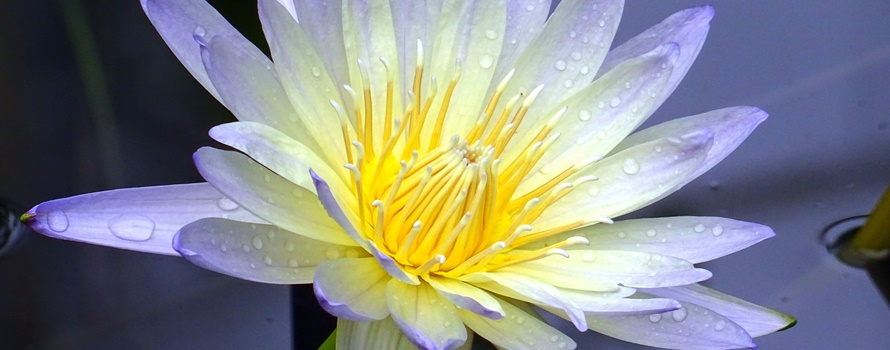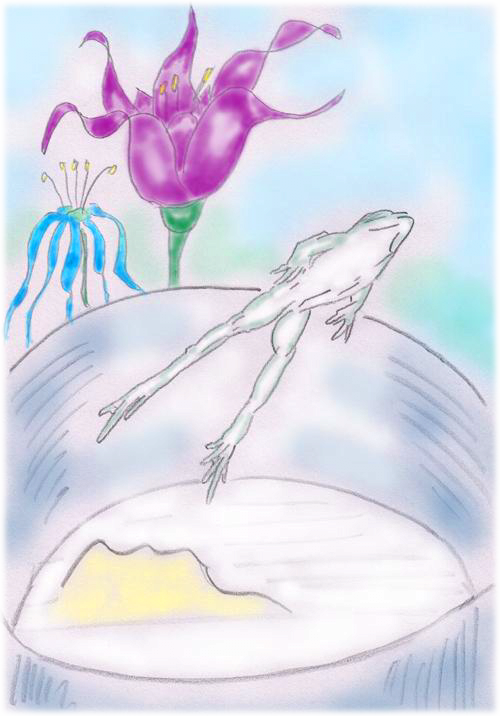Practical Help
Stopping Thought Chains
Practically all forms of depression are characterised by thought chains, which seem to have the purpose of continuously repeating the reasons for our depressions, and thus, justifying them.
Excerpt from a mail:
"Fighting negative thoughts – I have learned and developed some good methods and I have some years of experience with them. The important thing is not to fight against these thoughts, but simply letting the thoughts come and go, knowing that it is only a thought, nothing more. To be aware that this is a thought, but that I am NOT my thoughts. And it is important to concentrate on the positive.
It is also possible to suppress the negative thought before it is coming through – it is possible to recognise the negative thought a split second before it arises. In this case you focus your attention on anything else so as to ignore the negative thought even before it is coming.
But when you fight against the negative thoughts all the time, you will waste your energy and become weak soon. You’ll feel bad.
After my experiences, there is one thing which is really difficult: feelings, like fear, intense inner anxiety, inner pressure. Mostly it is not possible to eliminate them. You can weaken their influence by becoming as calm as possible, but I almost never managed to suppress them. But these intense negative feelings can be avoided by treating the related thoughts as I explained above. By preventing the thought chains you can avoid the negative emotional states."
Of course it is possible to further develop these advice.
Some Further Advice
- Exercise/ blood circulation. The more exercise we do, the better we will overcome a depression. Optimal activities are, for example, walking, practicing gymnastics, swimming, riding bicycle, hiking etc.
- Coffee can be helpful, though not as helpful as physical exercise.
- Distraction. Singing, listening to music, reading a good book, watching a movie.
- Seeking company, for example social activity, singing in a choir etc. If this isn’t possible, it can also be helpful to visit some well-attended pub – you won’t be alone there (here you can also write, draw etc.).
- In winter, a light therapy is helpful. Avoid dark rooms or turn on the light even during the day. Yellowish light is better than white light.
- Loving care is an excellent help against depression: children, fellow people, cats, dogs, horses, gardening – all this can help.
- Writing, poetry, drawing, making music. Don’t say you have no talent. It is possible to do all this for yourself, without presenting it to others.
- Doing something positive and constructive with yourself – for example, writing down your dreams and interpreting them, or writing down positive experiences.
- Avoiding negative thoughts and feelings resp. avoiding sources of them.
- In case of fear: think of the worst thing that could happen, with the result "life will go on", "it’s not that bad".
- A helpful method against the lethargy that occurs during depressions is to organise your days. Determine what you will do on each day: duties (like cleaning up, writing a mail etc.) but also things you’d like to do normally (music, watching a film etc.). Don’t set too much activities on one single day; one or two things are enough for a start, especially during a phase of depression. It will be satisfying for you to see that you managed something useful on that day.
- It occurs that, after a phase of deep depression, we want to change everything from one day to the other (especially in case of bipolar disorder). We make plans. Be careful! Do it step by step and be patient. Change one thing after the other, slowly. If you take on too much, you won’t be able to realise it all. The consequence can be that you become disappointed and slip into the next deep depression.
- Inner faith and confidence:

And if you can no longer bear
A light will come from somewhere.
On Analysing Ourselves
"Of course I tried to analyse my recurring thought chains – I analysed them over and over again, but this can never help. If you want to know what’s the problem, then ask yourself what makes you unhappy; just take a bit time for yourself and find out what really bothers you and what you really want for yourself in life. Drawing a figure of your inner motives can help much. For this you have to be aware of your motives – you can find them out by observing yourself throughout the day. But DON’T exaggerate it, and do it when you feel comparatively well and NOT in the middle of a deep depression. And DON’T analyse the thought chains – this can go very wrong! The thought chains are just a symptom of your unhappiness. Stop the thought chains – analysing them will only give them more power over you."
Necessity to Consider your Way of Life
Not only in the case of severe depression, but also in case of frequent, mild depressions it is very recommendable to pay special attention to your way of life – for several reasons.
Way of life – physical and psychic aspects
The depressions themselves change our lifestyle, so we have to counteract.
How does our body react to depressions?
- In case of depression, our vitality is reduced. This leads to lack of physical activity.
- Depression weakens our immune system, which leads to higher vulnerability to infections. That’s why we should ingest more vitamins by eating more fruits and vegetables.
- It is often recommended to prefer certain food. Some herbs also seem to be helpful, for example St John’s Wort (there are many websites on the internet about this topic).
- When depressions occur, we tend to eat less and only reluctantly. We don’t want to make an effort and so prefer fast food – a further reason why we should take care of our diet especially during depressions.
- Our breathing becomes shallow, not only because we lack physical activity; we also tend to stoop, which reduces lung volume.
Reactions of our Psyche
- Often we avoid social contacts during depressions. But social contact increases our alertness, it stimulates the circulation, distracts us etc.
- Lethargy. This is a great danger! Because of the lethargy, we are not willing to do anything against the depressions at all. Instead we take pills to take the easy way out, without considering the side effects. Especially in antidepressants, side effects are heavy.
- Reduced self-confidence. This makes us abandon our creative activities, because from the point of depression we consider ourselves unable to produce anything of quality. If we are not talented, we should at least photograph. Why? Because normally you will only photograph something interesting and beautiful. In this way, our eyes will be opened for interesting and beautiful things around us – and we will counteract the grayness of depression.
Way of life – spiritual aspects
In case of depressions, we should change our inner attitude as well.
- Wishes/ desires. Satisfying a wish will increase our well-being. But if a wish cannot be fulfilled, if it stays out of reach, this will have its effects inside of us and increase the tendency toward depression. Even small things can have their effect – maybe not as a single incident, but in case of many small events. Thus, it is advisable not to get carried away by desires, but to reflect on which of our wishes would be sensible.
- We have to realise that, during depressions, we also have a changed memory. Failures, problems and troubles are prioritised, while successes and beautiful experiences – present or past – are secondary. To counteract this, we should turn the tables: emphasizing positive experiences and don’t mind the negative ones too much.
- Way of thinking and acting are changed – we become discouraged and don’t dare to do anything that could be of risk. Thus, we aren’t able to create new and reviving situations in life.
- Purpose in life. We should think about that as well. Do we want to live blindly one day after the other, or are we able to give our life a meaning?
The Magic of our Mind
Like attracts like – this is an old magical inner law! But what does it mean?
It means that, according to our inner condition, we have an impact on our environment. If we are in a positive attitude, our fellow people will respond positively to this attitude as well. But not only that, there is more: for so far unknown reasons, our fate will also change positively in this case. Thus, our inner attitude responses to powers of which we do not know and which have an influence on what is happening around us.
On this, I’ll tell a fable:
The Frog in the Milk Pot
(originally: "The two frogs in the milk pot" from Aesop)
On a farmyard there stood a pot filled with milk. The day was hot. A frog passed by and climbed onto a flower. From there he could see the delicious liquid. "How nice it would be to take a bath on this hot day", he thought and jumped into the milk pot.
The bath was wonderful, but soon the frog was tired of swimming. He looked for a piece of driftwood or anything else, but there was nothing except for the high walls of the milk pot. He had nothing to help him jumping out. Desperately he swam for his life. He didn’t want to give up. Then he remembered what his grandmother used to say to him:And if you can no longer bear
A light will come from somewhere.
His grandmother had been a wise frog and he always had loved her. So, with his grandmother before his inner eye and her advice in mind, he continued swimming and didn’t give up, although he was very tired now. He was even more than only tired, but he kept swimming.
Suddenly he felt something solid beneath his feet. It was not yet enough, but it grew more. This had to be his grandmother, he thought, because she was in heaven, she could see everything and help him. The frog didn’t know that he had churned the milk to butter – well, he was not a farmer, so how could he know?
He rested on the butter for a while. Then he jumped out of the milk pot with a huge leap, and he landed right in a beautiful large flower.
© Alfred Ballabene (Vienna) translated by Corra


